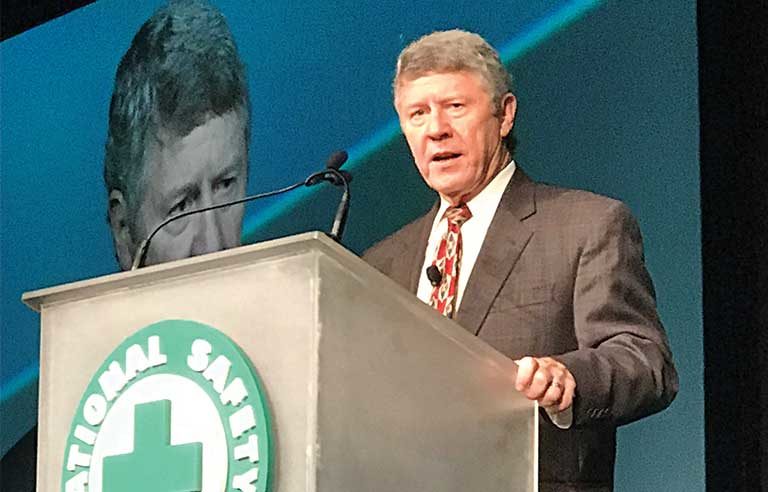Occupational Keynote: ‘The unpredictability of storms’ and other lessons learned from Hurricane Harvey

Houston — Before Hurricane Harvey came ashore in August 2017 in Harris County, TX, its ferocity was not a constant.
When hurricanes form, “we have a 120-hour window” to get people out, said Harris County Judge Ed Emmett, who presented the Occupational Keynote on Wednesday at the 2018 National Safety Council Congress & Expo.
“Harvey was a hurricane, then it came across [Mexico’s] Yucatan Peninsula and dissipated, went back to a tropical storm and nobody was worried,” said Emmett, who also serves as the county’s director of homeland security and emergency management. “Then, within 48 hours, it was a Category 4 hurricane. For six nights, it was brutal.”
Emmett said his emergency management team practices for such catastrophic storms “all the time,” adding that “hurricanes are easy compared to Harvey.”
According to the Harris County Flood Control District website, the county’s maximum rain measurement for seven days during Harvey was 47.4 inches, and more than two dozen rain gauges around the county measured at least 40 inches.
The unpredictability of storms such as Harvey was one of the key lessons Emmett and his team learned.
“Now we’ve had two storms – Harvey and Michael (earlier this month in Florida) – that came up from a tropical storm to a Category 4 or Category 5 storm in about 40 to 48 hours,” Emmett said. “Our timeline is 120 hours to get people out, so we’ve got to rethink that.”
The first, and perhaps most important, lesson Emmett shared was the need for constant communication.
“Communication between all the groups involved (is important),” he said. “Communication among the city, county, state, the Red Cross and everybody is vital. What’s more vital is the communication to the public. The public has to know what is going on.”
With a major disaster, media coverage and failures of various agencies can cause hurdles. Emmett said it is important for his team to avoid such distractions. “When you’re in the midst of a crisis, you need to be solving the crisis,” he said.
During most emergency situations, Emmett said he believes in letting trained team members do their jobs and empowering them to make decisions. “Don’t let them be afraid of doing their job,” he said.
Whether it is working with his staff, other agencies or the public, Emmett said people are the most important factor.
“In the end, it always comes back to people,” he said. “How we respond to a crisis comes back to people – us, the people who work for us and the people we serve.”
Some of the most rewarding work Emmett has done, he said, is dealing with emergencies. “You all understand safety,” he told the audience. “That’s your life. The emergency management piece is something I take very seriously and very personally.”
From the emergency operations center in Harris County, Emmett and his team of 50 full-time employees spent six nights monitoring weather, roads, shelters and a variety of impacts of Harvey.
“We have the largest, best, most technologically advanced emergency operations center in the country,” he said. “It looks like a casino floor. We have 98 workstations. When we’re activated, we have everybody from federal military access all the way down to local nonprofits.”
Emmett said his team assisted local agencies this year in Florida and the Carolinas.
“We know what to do,” he said. “We have a lot of moving parts. Everybody knows what their job is. When people say, ‘Are you ready for the next storm?’ Yeah, we’re ready. But every one is different.”
More than a year later, Emmett said he still is moved by the efforts of first responders and private citizens, such as the “Cajun Navy,” a group of hundreds of Louisiana citizens with boats who drove into Harris County to rescue people from flooded homes.
“To this day, I have no idea how they got here,” he said. “The roads were flooded. They helped save a lot of people. And our first responders were out there day after day after day.”
Post a comment to this article
Safety+Health welcomes comments that promote respectful dialogue. Please stay on topic. Comments that contain personal attacks, profanity or abusive language – or those aggressively promoting products or services – will be removed. We reserve the right to determine which comments violate our comment policy. (Anonymous comments are welcome; merely skip the “name” field in the comment box. An email address is required but will not be included with your comment.)

